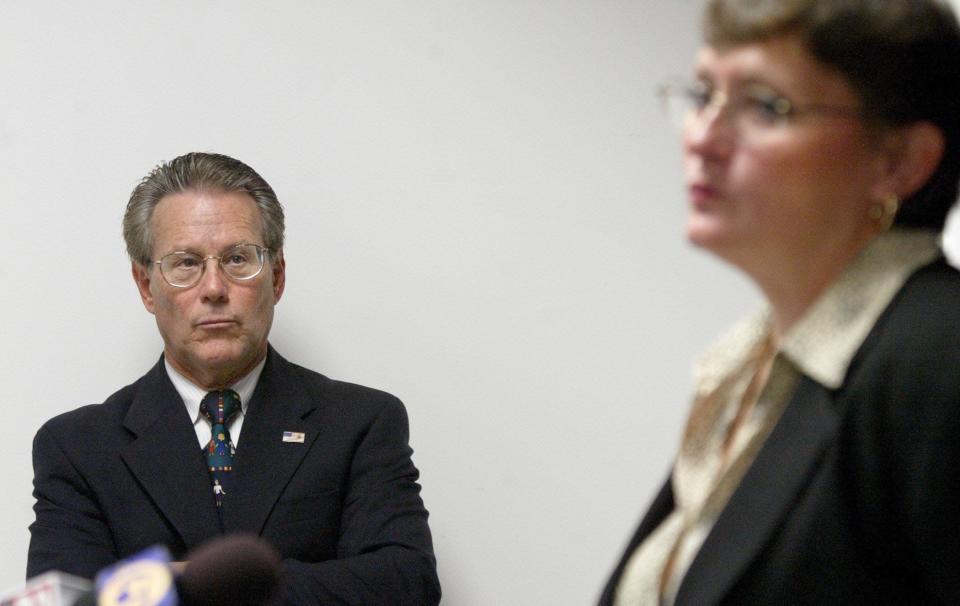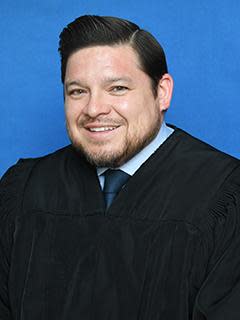Jeffrey Epstein judge holds grand jury transcripts for months. House passes disclosure bill
Legislation meant to release the transcripts of a 2006 Jeffrey Epstein grand jury is flying through Florida's Legislature, but the judge who already has been ordered to do just that as a result of a Palm Beach Post lawsuit has been holding them since last summer.
The House passed the bill unanimously Thursday, Feb. 15, with a standing ovation for sponsor Rep. Peggy Gossett-Seidman of Boca Raton. It is scheduled for the floor in the Senate next week.
The Epstein case "could have been stopped right here in Florida. We need to know why," she said.
However, when Circuit Judge Luis Delgado releases the transcripts as part of The Post's lawsuit, the bills will become moot. The legislation would take effect July 1.
An appeals court in May 2023 ordered Delgado to review, redact and release the material after The Post sued in 2019. The newspaper sought to make public what are usually highly secret proceedings after it learned from sources that then-Palm Beach County State Attorney Barry Krischer, the first official to ever consider criminal charges against Epstein, undermined his own case.
Only one underage victim testified before the grand jury, despite police finding nearly two dozen women and young girls who told similar stories of abuse at Epstein's Palm Beach mansion.
More: Appeals court orders judge to review, redact, release Epstein grand jury transcripts
When Krischer's prosecutor questioned the victim, the assistant state attorney undermined her own witness by pulling out the girl's MySpace pages, which depicted drinking and simulated sex. The pages had been supplied to the state attorney's office by Epstein lawyer Alan Dershowitz.
What emerged from the grand jury was a single felony charge of solicitation of a prostitute — what a "John" might face seeking an adult sex worker. It did not cover the fact that the victims were underage nor the fact that there were many of them.
Legislation filed at behest of Clerk Joseph Abruzzo
State Sen. Tina Polsky, a Democrat of Boca Raton, and Gossett-Seidman, also of Boca Raton. filed the legislation at the urging of Palm Beach County Clerk & Comptroller Joseph Abruzzo, whose office holds the grand jury records. His office was named as a defendant in The Post's lawsuit because it houses the documents.

More: Appeals court opens way to judge's review of Epstein grand jury transcripts
Abruzzo, a former state senator himself, asked Polsky to craft the proposed legislation after his lawyers successfully fought The Post at the trial court level when Judge Donald Hafele denied efforts to make the documents public. Hafele said that while The Post had a good case, he didn't have the authority to release the material.
A panel of the 4th District Court of Appeal ruled that the trial court judge did have the authority to release them and should do so after reviewing them for redactions and deciding what should be made public "in furtherance of justice," the tenet of state law on which The Post based its lawsuit.

Audio recordings of the grand jury proceedings were delivered by the clerk's office to Delgado's chambers in June, 2023 and The Post paid to have them transcribed.
Legislation meant to apply only to Jeffrey Epstein case
The bill is narrowly fashioned to apply only to the Epstein documents, said Gossett-Seidman.
"Unless Jeffrey Epstein has a clone somewhere ...," she said. "we're not intending to reopen any other case."
The language of the bill says the material may be made public as long the subject is dead, the proceedings are related to "criminal or sexual activity between the subject ... and a person who was a minor at the time," the state attorney has been notified and the testimony had been previously disclosed by a court order.
More: Jeffrey Epstein: Legislators file grand jury bills after Post lawsuit, investigation
As to the previous disclosure requirement, no court order to release the documents has been made public in any early criminal cases involving Epstein. Gossett-Seidman said the language was a nod to the judiciary that the Florida Legislature wasn't acting alone. Polsky said she thought some of the material had been released.
The first failure: How Barry Krischer tanked the Epstein case
Palm Beach police in a year-long investigation starting in 2005 had found nearly two dozen young women and girls who told them similar stories of sexual abuse at Epstein's Palm Beach mansion.
Krischer, known as a champion for children, seemed determined at first to vigorously prosecute Epstein, Palm Beach police detective Joe Recarey said in state attorney's office public records. Then once Epstein's high-powered attorneys swooped in, Krischer became cold to police, Recarey said.
Palm Beach Police Chief Michael Reiter, after suggesting Krischer step down from the prosecution, then sent his evidence to the FBI to take over the investigation.
Epstein was arrested in 2006 after the grand jury's indictment. Krischer, Epstein's attorneys and federal prosecutors negotiated what one prosecutor dubbed the "deal of the century" not to launch a federal indictment in exchange for a guilty plea and for him to register as a sex offender.
Epstein pleaded guilty in 2008 to two felony charges — solicitation of a prostitute and procuring a child for prostitution. Victims said later that they were never told about the plea ahead of the deal, though federal law requires the notification, nor did they have an opportunity to give the judge impact statements.
Epstein served 13 months of an 18-month sentence in the Palm Beach County Jail, from which he was allowed to leave on work release six days a week and 12 hours a day.
New York prosecutors would charge him with sex trafficking in 2019. Within weeks of his arrest, Epstein was found hanged in his Manhattan federal jail cell.
Holly Baltz is the investigations editor at The Palm Beach Post. You can reach her at hbaltz@pbpost.com.
This article originally appeared on Palm Beach Post: Jeffrey Epstein grand jury transcipts judge sits on material for months

